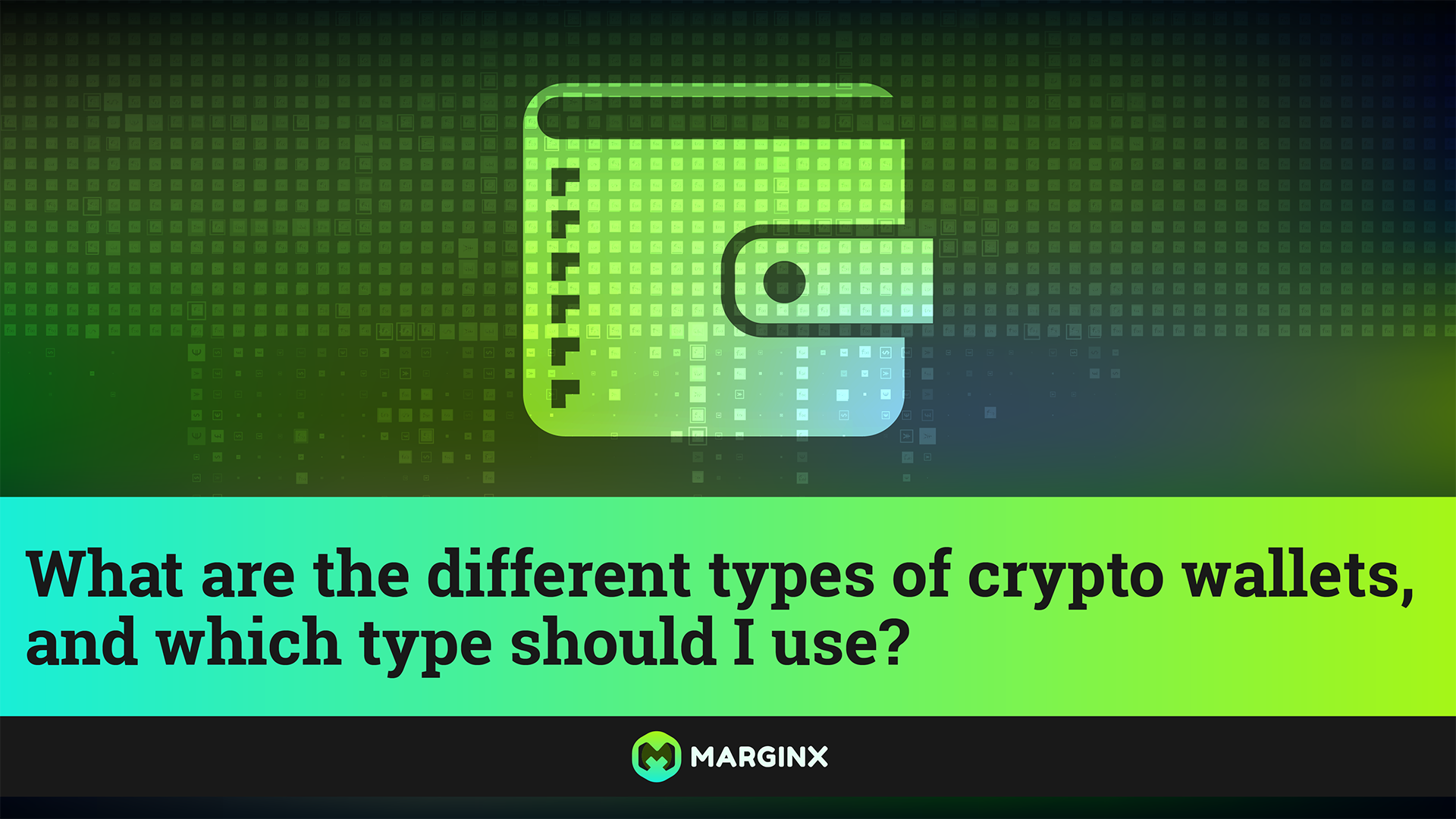
TL;DR 1. Crypto wallets store the private and public keys required for you to authorize transactions on crypto blockchains 2. Cold wallets are more secure than hot wallets at the expense of convenience and usability 3. A non-custodial hot wallet offers traders convenience while providing a high level of security
GM champs, we all know we need crypto wallets whether we’re devs, hodlers, traders or degens. Our crypto wallets can be thought of as our private crypto bank account where we can buy, sell, lend and earn crypto. As with all bank accounts, we want our crypto to be safu, while at the same time available 24/7.
Join us as we cover some crypto 101 here and talk about how we can keep our crypto safu.
What is a crypto wallet?
Crypto wallets store the private and public keys required for you to authorize transactions on crypto blockchains.
What we refer to as private keys usually appear as a recovery phrase (also known as seed phrase) consisting of 12 or 24 English words. These are easier to remember compared to a long string of gibberish. We highly recommend writing your private keys down and keeping it secret, offline and stored securely.
As for public keys, these are usually another long string of gibberish stored on the blockchain that help to generate your public wallet address and other public-accessible transaction records. They are public, so anyone can see it. Fun fact: when we track whale transactions, we are basically monitoring the public wallet address generated by the whale’s public keys.
So, your wallet does not actually contain your crypto. Instead, they contain the keys that allow you to access your crypto on the blockchain.
This is why everyone keeps going about “not your keys, not your crypto”. If you don’t have custody of your private keys, you do not really have control of your crypto, and getting rekt can be just a centralized exchange rugpull away.
Types of crypto wallets
— Cold wallets and hot wallets
Now, they’re not really Katy Perry’s thing, but they do come in Hot N Cold flavors.
Cold wallets can simply be a piece of paper where the private and public keys are written. They can also be hardware wallets, where the same keys are encrypted electronically and stored. Most hardware wallets come with a physical button that usually has to be pressed to authorize transactions.
Why do OG crypto degens always preach about cold wallets?
Well, cold wallets are air-gapped, which means they are offline and not accessible to hackers. And when you connect your computer to a hardware wallet, transactions are signed on the hardware wallet itself. This prevents your private keys from getting compromised even if you have malware on your computer.
Hot wallets, on the other hand, are always connected to the internet. These come in forms such as wallet apps on your phone, software or browser extensions on your computer. Your crypto wallet on your centralized exchange is a form of hot wallet too.
Hot wallets encrypt and store your public keys but access to your private keys depends on whether they are custodial or non-custodial in nature. There is the risk of hackers accessing your private keys as hot wallets are always online.
It’s not the end of the world though. We believe that with the appropriate level of security hygiene on your devices, non-custodial hot wallets can offer a relatively high level of security while not compromising on convenience.
— Custodial and non-custodial wallets
Now, let’s talk custody and this has nothing to do with your ex.
A non-custodial wallet simply means that you are in possession of your private keys and only you can authorize transactions of the crypto you own. This applies to all cold wallets, and non-custodial hot wallets (app, desktop and browser extension wallets).
Mobile app and desktop wallets are simply software, except one exists on your smartphone, while the other on your computer. They’re both non-custodial hot wallets with a PIN or password and a recovery phrase that allows you to recover your crypto wallet. Between the two, mobile wallets offer a good balance between convenience and security. Some examples of app wallets are f(x)Wallet and MyEtherWallet. A popular desktop wallet is Exodus.
Browser extension or web-based wallets are accessed via your browser, and since there’s nothing to download, you can access this crypto wallet from any smartphone, tablet or computer. These are considered the least secure types of crypto wallets given their continuous connectivity to the internet.
A custodial wallet such as centralized exchange wallets does not provide you with private keys. The centralized exchange is responsible for the security of your crypto from hackers. It also means that the centralized exchange ultimately owns the crypto in your wallet since it holds the private keys.
In other words, if the exchange is rekt, you’re rekt.
What is the safest and most secure wallet?
This would depend on your usage. Generally, cold wallets are more secure than hot wallets at the expense of convenience and usability.
If you are a hodler, get a hardware wallet and keep your private keys locked in a safe deposit box somewhere. You have custody of your private keys and like our favorite Mandalorian likes to say, “This is the safu way.”.
For most of us, we should also keep our hodl stash cold. But those crypto that we intend to trade, swap, or participate in DeFi, keeping them cold isn’t very practical or convenient. We would more likely than not settle on a practical hot wallet that is convenient, while offering a reasonable level of security.
Which crypto wallet should I use?
— Security vs convenience
As an illustration, this shows the level of security vs convenience for different types of crypto wallets.

Cold Wallet > App Wallet > Desktop Wallet > Browser Wallet > Centralized Exchange Wallet
Hodlers and bag holders will probably have their crypto secured in their cold wallets. If you are a hodler and do not have a cold wallet, we suggest you get one.
Traders who trade actively on centralized exchanges would usually keep their trading funds on the centralized exchange’s custodial hot wallet. That is understandable since traders would like to access their trading funds as soon as possible to capitalize on time-critical trading opportunities.
Moving funds in and out of the exchange every time to execute the trade would not make sense as it incurs both time and cost penalties.
However, we do advocate that you only keep funds that you trade on the exchange’s hot wallet. The rest of your funds should be in a non-custodial wallet where you are in control of your private keys.
— Cost
Unless you scribble your keys on your beer coaster, cold or hardware wallets are usually not free. The price typically starts from US$50. Hot wallets, on the other hand, are usually a click away and can be downloaded for free. In the case of centralized exchange wallets, these are part of the exchange platform.
A crypto wallet that offers security and convenience
Can we have our cake and eat it though? We want convenience and security at the same time, while waiting for our coins to moon?
To answer this question, let us assume that you would like to trade your crypto regularly, yet would like to have custody of your crypto. You would need access to a decentralized exchange that allows trading from a non-custodial wallet.
The MarginX exchange and the f(x)Wallet may just be the solution you are hoping for.
MarginX is the world’s first community-based decentralized exchange infrastructure. Our infrastructure allows us to handle a throughput of up to 20,000 transactions per block, resulting in super low transaction fees. Crypto is traded through non-custodial wallets, such as f(x)Wallet, and all transactions take place on-chain so they are secure, verifiable and transparent.
f(x)Wallet is a decentralized, non-custodial, private key wallet that supports a number of blockchains and tokens. It also offers cross chain support, various DeFi features including staking, savings, swaps and enables users in over 170 countries to buy crypto via an on-ramp.
Voila, there you have it, f(x)Wallet is a non-custodial hot wallet that offers traders on MarginX convenience while providing a high level of security, and ensuring that your crypto will be yours, always.
